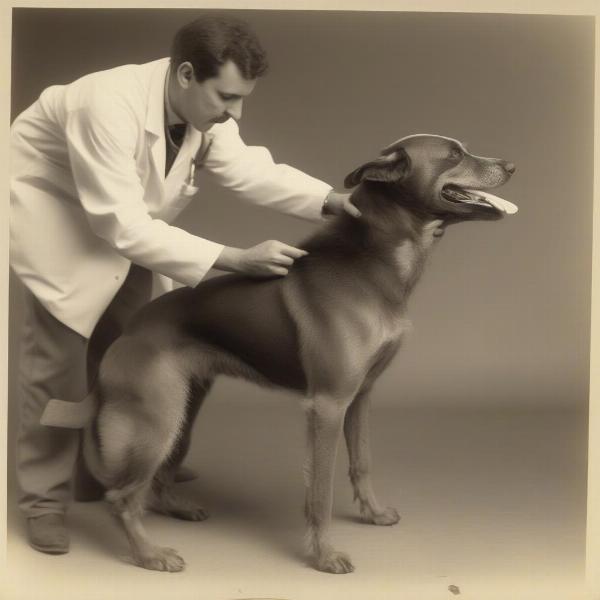Spherocytosis in dogs is a relatively rare inherited blood disorder characterized by red blood cells that are spherical rather than the normal biconcave disc shape. This abnormal shape makes the red blood cells fragile and prone to premature destruction in the spleen, leading to a condition called hemolytic anemia. While not common, it’s important for dog owners to be aware of this condition so they can recognize potential symptoms and seek veterinary care if necessary.
What Causes Spherocytosis in Dogs?
Spherocytosis is caused by genetic mutations affecting proteins that maintain the normal structure of red blood cells. These mutations are typically inherited in an autosomal dominant pattern, meaning that a dog only needs to inherit one copy of the mutated gene from one parent to develop the condition. Certain breeds, such as Basenjis, Beagles, and Miniature Schnauzers, are predisposed to spherocytosis.
Recognizing the Symptoms of Spherocytosis
The severity of spherocytosis can vary widely among affected dogs. Some dogs may exhibit no clinical signs, while others can experience severe anemia. Common symptoms include lethargy, weakness, pale gums, jaundice (yellowing of the skin and mucous membranes), and an enlarged spleen. Some dogs may also experience intermittent episodes of increased red blood cell destruction, known as hemolytic crises.
Diagnosing Spherocytosis in Your Dog
If you suspect your dog might have spherocytosis, it’s essential to consult with a veterinarian. They will perform a thorough physical examination and conduct diagnostic tests, including a complete blood count (CBC) to evaluate red blood cell morphology and assess the presence of anemia. A specialized test called an osmotic fragility test can confirm the diagnosis by demonstrating the increased fragility of the red blood cells.
 Veterinarian Examining a Dog for Spherocytosis
Veterinarian Examining a Dog for Spherocytosis
Treatment Options for Canine Spherocytosis
Treatment for spherocytosis depends on the severity of the condition. Mild cases may not require any specific treatment, while more severe cases may necessitate blood transfusions to address anemia. In some cases, surgical removal of the spleen (splenectomy) may be recommended to reduce the destruction of red blood cells. This procedure can significantly improve the quality of life for dogs with severe spherocytosis.
Living with a Dog Diagnosed with Spherocytosis
With proper management, dogs with spherocytosis can live relatively normal lives. Regular veterinary checkups are essential to monitor their red blood cell counts and overall health. Owners should also be aware of the signs of a hemolytic crisis, such as sudden weakness, lethargy, and increased jaundice, and seek immediate veterinary attention if these occur.
Conclusion
Spherocytosis is a manageable condition in dogs. While it requires careful monitoring and occasional veterinary intervention, affected dogs can live full and happy lives with the right care. Early diagnosis and appropriate management are key to ensuring a positive outcome for dogs with this inherited blood disorder.
FAQ
- Is spherocytosis contagious? No, spherocytosis is an inherited genetic disorder and is not contagious.
- Can spherocytosis be cured? There is no cure for spherocytosis, but the condition can be managed effectively.
- What is the life expectancy of a dog with spherocytosis? With proper management, dogs with spherocytosis can have a near-normal lifespan.
- What are the signs of a hemolytic crisis? Sudden weakness, lethargy, pale gums, and increased jaundice can indicate a hemolytic crisis.
- Is spherocytosis painful for dogs? Anemia associated with spherocytosis can cause weakness and lethargy, but the condition itself is not typically painful.
- Can spherocytosis be prevented? Since spherocytosis is a genetic disorder, it cannot be prevented. However, responsible breeding practices can help reduce the incidence of the disease.
- What should I feed a dog with spherocytosis? A balanced and nutritious diet is important for all dogs, including those with spherocytosis. Consult your veterinarian for specific dietary recommendations.
ILM Dog is your trusted source for expert advice on dog breeds, health, training, nutrition, grooming, and much more. We’re dedicated to providing dog owners worldwide with practical and reliable information to help them care for their furry friends. If you’re looking for the best resources on dog care, visit us at ILM Dog. For personalized advice and inquiries, contact us at [email protected] or +44 20-3965-8624.